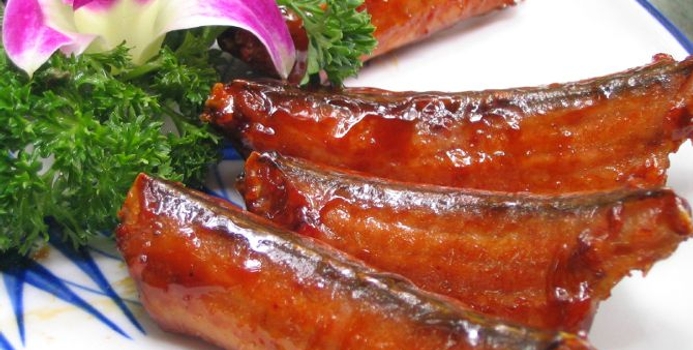The Nutrition of Snake

Snake meat is not common in
Western meals, but is popular in other cultures for its supposed health
benefits. Snake meat is also being more widely accepted as a healthy
exotic game meat, and is often offered along side other exotic meats
like alligator and ostrich in Western restaurants or over the Internet.
What is Snake Meat?
Snakes are reptiles that are found in most countries in the world. Some snakes are venomous, meaning that they can inject poison into the bloodstream through a bite. The most popular snake meat in the United States comes from rattlesnakes, although other types, such as python, are available over the Internet. Rattlesnake meat is commonly eaten in the Southwest, and popular recipes include rattlesnake chili and barbecued snake meat. Other cultures generally eat their own, locally found snakes.
Snakes are considered medicinal in Chinese lore, as a "warming" food, and the blood of snakes is often mixed with liquor to produce a virility enhancer. Traditional South American medicine includes dried or powdered snake meat which is believed to cure several different illnesses. Snake meat is usually said to taste like chicken, but a closer approximation is frog legs. Snake meat can be very tough if not prepared well.
Health Benefits of Snake
Snake meat contains protein like any other type of meat. Protein is necessary for many body systems, including the development of muscles. Protein provides amino acids the body cannot obtain any other way, which do everything from building cell walls, to regulating hormones. Snake meat contains roughly 93 calories per 100g (3.5 oz) of raw meat, depending on the type of snake. This is roughly half the calories and one third the amount of fat of a similar amount of sirloin beef steak. Fewer calories and less fat content for the same weight of meat can aid dieters in controlling their weight.
Cautions About Snake Meat
As snake meat is not often sold commercially in the United States, it does not have particular, rigid health standards that other meats do. Rattlesnake meat is often sold from "Rattlesnake Roundups," which are similar in atmosphere to rodeos and have been accused of low standards of food preparation. This is of particular concern as rattlesnake meat in South America has been linked several times with severe strains of salmonella, which grows in the snake's gut. This bacteria is neutralized by proper handling and by cooking. Snakes, like other animals, may also contain parasites and other infections that can be transmitted to humans, which can also be neutralized by proper handling, freezing, and thorough cooking. Snake venom must enter the blood stream to pose any danger to people, so there are no concerns about poisoning from eating most snakes.
Snake meat is relatively low in fat and calories, high in protein and some consider it a rising star in the food industry. However, like any type of meat, it should be prepared and cooked carefully to ensure it does not result in infection or food poisoning.
What is Snake Meat?
Snakes are reptiles that are found in most countries in the world. Some snakes are venomous, meaning that they can inject poison into the bloodstream through a bite. The most popular snake meat in the United States comes from rattlesnakes, although other types, such as python, are available over the Internet. Rattlesnake meat is commonly eaten in the Southwest, and popular recipes include rattlesnake chili and barbecued snake meat. Other cultures generally eat their own, locally found snakes.
Snakes are considered medicinal in Chinese lore, as a "warming" food, and the blood of snakes is often mixed with liquor to produce a virility enhancer. Traditional South American medicine includes dried or powdered snake meat which is believed to cure several different illnesses. Snake meat is usually said to taste like chicken, but a closer approximation is frog legs. Snake meat can be very tough if not prepared well.
Health Benefits of Snake
Snake meat contains protein like any other type of meat. Protein is necessary for many body systems, including the development of muscles. Protein provides amino acids the body cannot obtain any other way, which do everything from building cell walls, to regulating hormones. Snake meat contains roughly 93 calories per 100g (3.5 oz) of raw meat, depending on the type of snake. This is roughly half the calories and one third the amount of fat of a similar amount of sirloin beef steak. Fewer calories and less fat content for the same weight of meat can aid dieters in controlling their weight.
Cautions About Snake Meat
As snake meat is not often sold commercially in the United States, it does not have particular, rigid health standards that other meats do. Rattlesnake meat is often sold from "Rattlesnake Roundups," which are similar in atmosphere to rodeos and have been accused of low standards of food preparation. This is of particular concern as rattlesnake meat in South America has been linked several times with severe strains of salmonella, which grows in the snake's gut. This bacteria is neutralized by proper handling and by cooking. Snakes, like other animals, may also contain parasites and other infections that can be transmitted to humans, which can also be neutralized by proper handling, freezing, and thorough cooking. Snake venom must enter the blood stream to pose any danger to people, so there are no concerns about poisoning from eating most snakes.
Snake meat is relatively low in fat and calories, high in protein and some consider it a rising star in the food industry. However, like any type of meat, it should be prepared and cooked carefully to ensure it does not result in infection or food poisoning.


No comments:
Post a Comment